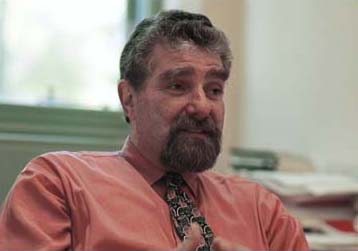Penn'ing great poetry
The poetry of Professor Gregory Djanikian was recently published in a major poetry anthology.
The Daily Pennsylvanian
October 26, 2000
When Gregory Djanikian majored in English at Penn about 30 years ago, he complained that there was no place to share his passion with other writers.
Sure, there was Bennett Hall just as there is today. But classrooms, after all, are confining. He needed a place for listening to his peers, for throwing around ideas -- for inspiration.
So, for the literary minded, it's a good thing that Penn has changed in the last three decades. Because now, Djanikian has himself a thriving, poetry-loving community.
This year, the head of the University's creative writing program -- about 75 English majors concentrate in creative writing -- even found a space of national prestige to share with other published writers, including English Professor Susan Stewart, in The Best American Poetry 2000.
The annual anthology's latest edition features pieces from the two Penn English professors, honoring their poems as being among the country's 75 best. English Professor Bob Perelman's work has also graced the book's pages in previous years.
"I didn't know that the poem was going to be selected or that it was even read," said Djanikian, whose uncollected work "Immigrant Picnic" first appeared in a 1999 Poetry magazine issue.
Djanikian, 51, returned to Penn in 1983 after teaching in New York public schools and lecturing in the halls of Syracuse University and the University of Michigan. Now part of the Penn creative writing team, he plays ping-pong with a colleague on the same day that he schedules world-famous authors at the Kelly Writers House.
In his first-floor Bennett office that offers a view of the congested 34th and Walnut intersection, Djanikian is the first to admit that poetry is, for him, an indispensable part of his being.
"It seems to me I can only make sense of my feelings toward the world when I sit down and try to articulate through language, how I confront the world, how it confronts me, how I move through it," he says.
A native of Alexandria, Egypt, who eventually settled in Williamsport, Pa., Djanikian tried to capture the oddities of spoken language in "Immigrant Picnic," the poem that Pulitzer Prize-winning writer and guest editor Rita Dove chose as one of America's "Best."
Djanikian, who says his life revolves around his two teenage children, mowing the lawn and writing, recently completed his fourth poetry collection, Years Later, and is toiling away on a fifth.
Much of Djanikian's prior work has dealt with personal experiences in his homeland and in acclimating himself to American culture.
His newest collection, however, represents an entirely different theme.
Years Later, released in 2000, focuses on the idea that love -- "that power which sometimes crosses boundaries between self and other" -- would not be so cherished if we did not feel it could fail at any moment, sending us back to ourselves. Relationships possess an amount of aloneness even when lovers are together.
Why the disconnect from a writer who admits to connecting with humanity?
"I wanted to give voice to the experience of being separate even as one is together with someone else. It was just the time in my life that was right," Djanikian says, behind a graying goatee and mustache. "What you are writing about seeks you out."
This is a message he relates to his students.
This semester, Djanikian is teaching an introductory poetry workshop for undergraduates from all four schools, while advising about 30 creative writing English majors.
Students look up to the man who once stood in their shoes.
"He knows his stuff," College senior Tim Noble said.
Djanikian started advising Noble, who concentrates in creative writing, when he transferred from the Engineering School at the end of his freshman year. He took one of Djanikian's workshops last spring, where he received further inspiration by watching his mentor rattle off the last few lines of a poem that he had been working on for more than a year -- right in front of the class.
Djanikian credits the Writers House with helping him find a niche to pursue his passion. There, he belongs to a community of wordsmiths, speakers and musicians that, collectively, has put Penn on the map.
Indeed, Djanikian can take comfort in knowing that he's not the only one transforming thoughts into poems.
For instance, the well-respected Perelman appeared in The Best American Poetry in 1988, 1989 and 1991 before making The Best of the Best American Poetry in 1998. Perelman praised Penn's burgeoning creative writing program, citing the Best American kudos and Writers House activities.
"[Creative writing here] is in very lively shape," Perelman said.
Research universities, like Penn, pride themselves on creating new knowledge. Writers House Faculty Director Al Filreis commended his English Department colleagues for creating new "expression."
He pointed to the distinction that Stewart and Perelman hold as both poetry critics and writers.
"Most creative writing programs are involved in a schizophrenic relationship with the English Department," Filreis said. "We've overcome the creative-critical divide."

